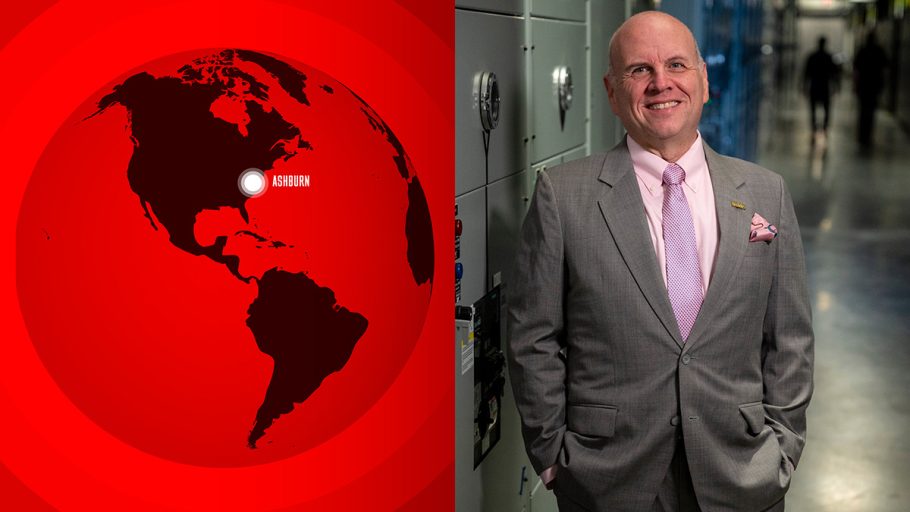It is estimated that the US data center market will reach 26 billion USD by 2027. Northern Virginia is the undisputed leader in data centers not just in the US, but worldwide. Ashburn, a city in Northern Virginia about 34 miles from Washington DC in Virginia’s Loudoun County, is often viewed as the data center capital of the world. Home to what’s known as “Data Center Alley”—a six-square-mile cluster of businesses, government organizations, and colocation / hyperscale data centers—it hosts over 3,000MW of total inventory and supports more than 30 million square feet of data center space and counting, with 965MW under construction.
While its location (near domestic hotspots and convenient for international companies), as well as both support from local government and reasonable cost of land and electricity, were what initially positioned Ashburn as a data center hub, increasing demand for connectivity and capacity is what continues to drive its power. Every major data center provider (enterprise, wholesale, colocation, and hyperscale), plus every major cloud provider and fiber provider, has a presence in Ashburn.
Hyperscalers are a particularly big factor in Ashburn’s standing. Today, the US carries 53 percent of global hyperscale data center capacity, compared to 26 percent in Asia Pacific, 16 percent in Europe, and 5 percent in the rest of the world. Although Ashburn and the US are still home to the largest development pipeline, significant growth is being seen all over the world, especially in markets like Hong Kong, Tokyo, Sydney, and Mumbai.
In the pages that follow, we dive into both this data center capital as well as sixteen other global markets to understand the role, challenges, and opportunities of data centers in this data-driven world. Adding to our expertise around Ashburn and the US data center market, we invited data center leaders from Australia, Brazil, Canada, Finland, Hong Kong, Japan, Kenya, India, Indonesia, Ireland, Malaysia, Singapore, South Africa, the United Arab Emirates, the United Kingdom, and Uruguay to share their thoughts.
What is the current state of the data center market in your region?
Northern Virginia continues to be the largest data center market in the world. In Loudoun, we have more than 31 million square feet of data center space in operation with another four million square feet under development. We are at more than 2.5 gigawatts of power and have accelerated power infrastructure delivery in order to meet future demand.
What are the key drivers and goals of the data center business in your region?
Northern Virginia continues to see great demand for data center capacity. A great deal of the growth is organic, as many of the industry’s top players are expanding their footprint. The cloud continues to drive demand, along with AI, government, and financial sectors.
What benefits do the local area recognize from the industry?
The data center industry has helped to transform our area from a government town to a technology town. Northern Virginia has been able to attract one of the most technologically trained workforces in the world, and the data centers have been a big driver of that. And you can’t underestimate the impact that the industry has had on our economy. We’ll receive in the area of 750 million dollars in local tax revenue from data centers this year alone, which means better schools, improved transportation, and a better quality of life for our residents, while saving them thousands of dollars in taxes.
What are the biggest advantages for your location as a data center cluster?
We have created an environment where all types of businesses can be successful. We offer a supportive business environment, world-class infrastructure, and an amazing and diverse workforce.
Who are the biggest champions for data centers in the region?
We are very lucky to have a great support system in Northern Virginia for the data center industry. I’m constantly impressed by the leadership shown by our data center leaders, many of whom are considered pioneers for the industry. The Data Center Coalition, under the leadership of Josh Levi, has become the premier voice advocating for data centers. Many of our elected officials and professional staff in Loudoun have also been great advocates for our industry. I’d also like to highlight the work of Northern Virginia Community College, which has been a leader in providing education for the next generation of the data center workforce. (EDITOR’S NOTE: Buddy Rizer serves on the Board of Northern Virginia Community College.)
What challenges have you identified, and what is being done to overcome those challenges?
The biggest challenge in the last year has been electric infrastructure. Because of the density of demand in Data Center Alley, we have had some delays in power delivery in some areas of the county. I have been working proactively with Dominion Energy, our power provider, to fast-track infrastructure that will bring our market to full functionality by the end of 2025. We are also planning for future lines to ensure that both availability and resiliency will continue to be a hallmark of our region. We have also had some citizen and political pushback on the industry over the past few years. I compliment the industry, led by the Data Center Coalition, for being an active participant in discussions to find solutions and alternatives to address citizen concerns.
What are the future goals for the data center industry in your region?
We want to continue to be the best place in the world for data centers to locate and succeed. When an industry reaches the size of ours, it’s important to manage the growth in a smart and sustainable way. We’d like to be at the forefront of the data centers of the future, promoting new energy technologies, leading the way on clean energy usage, providing the workforce of tomorrow, and creating a template for data center growth worldwide.
How do you see data centers contributing to the digital transformation in the years to come?
When you look at the way the industry has evolved over a relatively short period of time, you can’t help but to be excited about the future. I’m particularly excited about technologies that will impact the way energy is produced, used, and stored. This is an area of great interest for me personally and for our community. It’s also very exciting to think about the way the data center industry is providing the infrastructure for future technologies that will greatly impact the life of the people we serve. From AI to education to entertainment to health and so much more, data centers are the critical infrastructure that will enable innovation and digital transformation for the future.

Exclusive Giveaway: The Limited-Edition Data Center World Tour T-Shirt
ABOUT THE AUTHOR
Buddy Rizer is an experienced strategic leader, manager, communicator and sales professional. In his current role, he leads the agency responsible for encouraging growth and developing relationships with Loudoun’s business community in both the commercial and agricultural-based business sectors. During his tenure, Rizer and his team have attracted more than 50 billion USD in new commercial investment and more than 50 thousand new jobs. Rizer joined Loudoun County in 2007 and helped build “Data Center Alley” into the largest concentration of data centers in the world. He also has extensive international business development experience in China, France, Germany, Russia, Ireland, United Kingdom, Finland, Taiwan, Japan, India, Korea, Ghana, Uruguay, and the United Arab Emirates.
Rizer also serves as Chair of the Northern Virginia Economic Development Alliance and is a member of the Board of Trustees for Northern Virginia Community College, Past-Chair of the Northern Virginia Community College Foundation Board, and Secretary of the Go Virginia Region 7 Council. He is on the Board of Directors for the Northern Virginia Technology Council, the Northern Virginia Chamber of Commerce, and the Washington Airports Task Force. He is also Chair of the Rivana at Innovation Station Community Development Authority.



